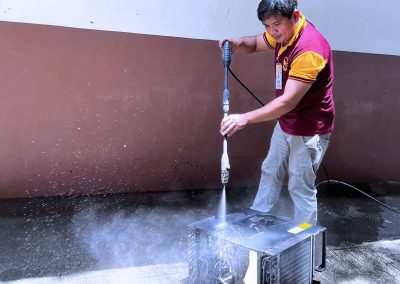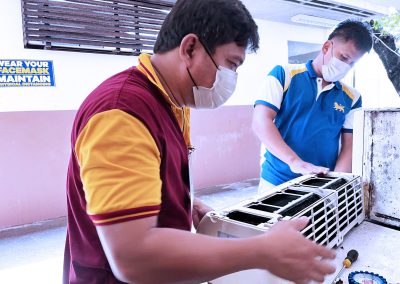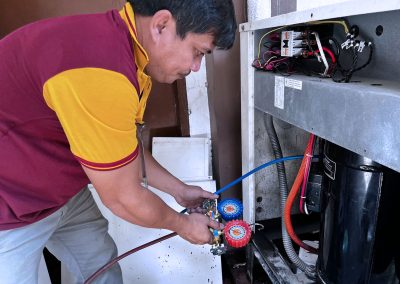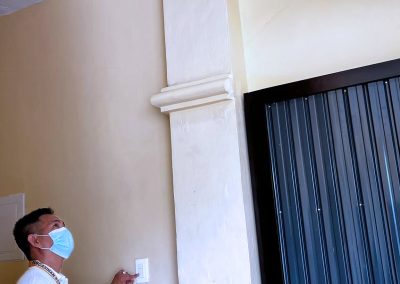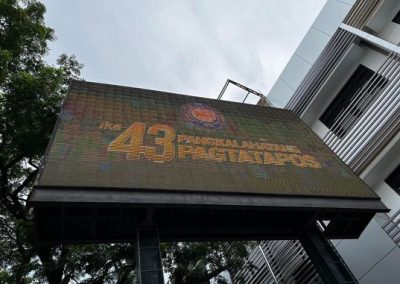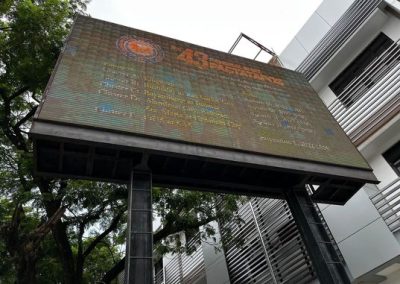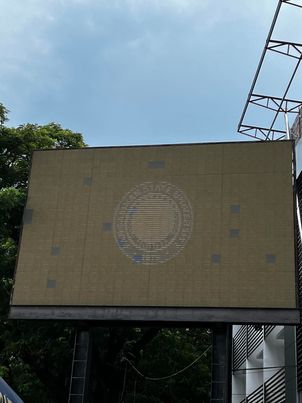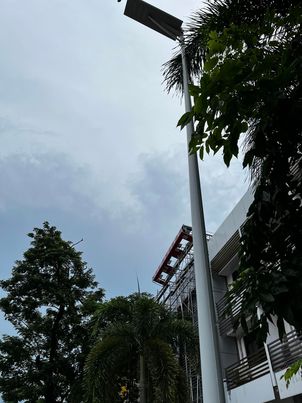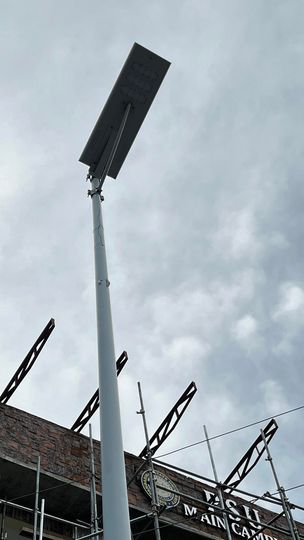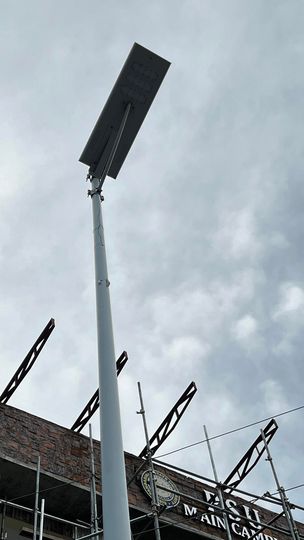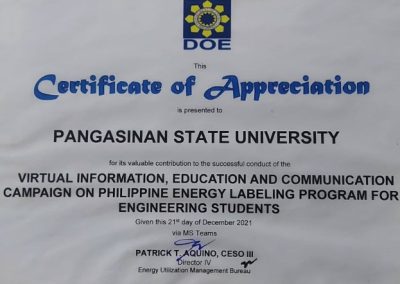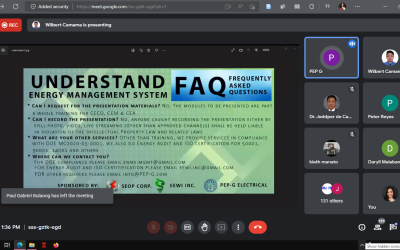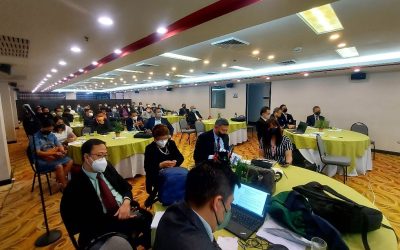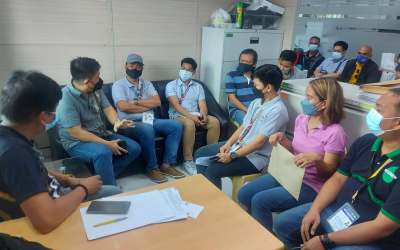PSU Energy Efficiency and Conservation Office
The Pangasinan State University supports the implementation of the national government’s Energy Conservation Program as articulated in the DOE Department Circular No. DC2019-11-0014 or the Implementing Rules and Regulations of Republic Act No. 11285 (Energy Efficiency and Conservation Act).
The university policy on Energy Conservation is crafted with the Inter-Agency Energy Efficiency and Conservation Committee (IAEECC) Resolution No. 1 s. 2020 as the legal bases. The provision of the law states the following:
Government Energy Management Program (GEMP)
Section 43. Scope. The GEMP shall cover all government agencies, including all departments, bureaus, offices, agencies, branches, and instrumentalities or political subdivision, GOCCs, including its subsidiaries or other self-governing board or commission of the Government, LGUs, State Universities and Colleges (SUCs). The IAEECC shall issue the appropriate order for the implementation of the GEMP.
Each government entity shall formulate an energy efficiency and conservation program to include energy conservation measures, target savings, motor vehicle inventory, and other strategies consistent with the GEMP. Each government entity shall allocate an appropriate amount from its approved annual budget for the implementation of its prioritized and planned energy management program and shall include its budget preparation necessary funds for its energy management program from 2020 onwards.
The Inter-Agency Energy Efficiency and Conservation Committee (IAEECC)
Section 35. Creation of the Committee. An Inter-Agency Energy Efficiency and Conservation Committee (IAEECC) is hereby created pursuant to Section 9 of the RA11285 to evaluate and approve government energy efficiency projects, as defined under the Act and the EEC-IRR, and to provide strategic direction in the implementation of the GEMP.
The Inter-Agency Energy Efficiency and Conservation Committee (IAEECC) shall issue guidelines on the use of the savings realized through energy efficiency and conservation program which may include the improvement of energy efficiency in its facilities and the base year for the computation of energy savings and the schedule of its periodic adjustments.
Section 44. Reportorial Requirements. Each LGU through its EECO and government entity, through its applicable office, shall prepare an energy performance report that contains, among others, the monthly breakdown of its energy performance and such other information to be prescribed by the DOE, and submit such report to the IAEECC, copy furnished the DOE, not later than the prescribed periods.
Section 45. Designation of Energy Efficiency and Conservation Officer by Each Government Entity. To fully address the thrust of the GEMP, the head of each government entity shall also designate an energy efficiency and conservation officer.
PSU ENERGY MANAGEMENT EXISTING POLICIES
1. In buildings and offices where adequate ventilation is available, all offices shall discontinue the use of their air-conditioning facilities, especially during the cooler months from August to February.
2. In cases where air-conditioning units are to be used, they shall be switched on not earlier than 9:00 a.m. and switched off not later than 4:00 p.m. During lunch breaks, the air-conditioning units shall be switched on “FAN” mode. Room setting temperature should not be lower than 25 degrees centigrade. Energy saving plugs are installed. Regular check up and maintenance of air-conditioning units should be undertaken on a quarterly basis.
3. Computers, equipment and other appliances should be turned off when not in use. Computers should be used be strictly for official use only. Playing of computer games during lunch and break times is highly discouraged. Refrigerators should be switched off during weekends, holidays and long vacations. Ovens and electric stoves in offices are prohibited except for laboratory purposes.
4. Electric fans in classrooms, laboratories and offices should be switched off when not in use. Faculty should ensure that they are switched off after every class.
5. All incandescent light bulbs should be replaced with LED lights. Light bulbs with 50W and 100W should be replaced with 32W to reduce consumption and increase percent energy consumption. All lighting fixtures should be cleaned regularly. All outdoor lightings of the various campuses should be turned on from 7PM to 5AM. Ensure that all lightings in gyms, covered courts, audio visual rooms, conference rooms, canteens and comfort rooms should be turned off when not in use.
The Energy Efficiency and Conservation office of PSU is making sure that the office is equipped with the latest news and trends regarding the implementation of RA11285 by regularly attending the DOE Public Consultations.
NEWS
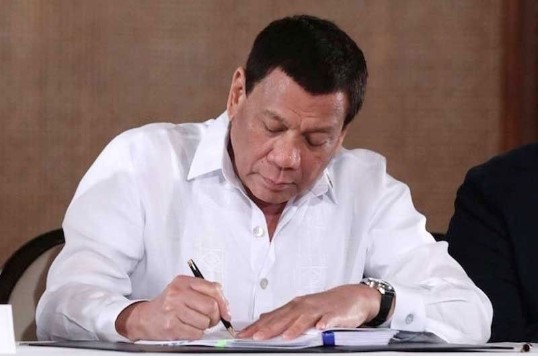
On April 12, 2019, RA 11285 was approved and signed into law by President Rodrigo Roa Duterte and became effective on May 22, 2019. The RA 11285 emerged more comprehensive than BP 73 or the Batas Pambansa 73 (BP 73) or “An act to further promote energy conservation and for other purposes.”. RA 11285 institutionalized energy efficiency and conservation, enhanced the efficient use of energy, and granted incentives to energy efficiency and conservation projects.
Pangasinan State University is one of the first State Universities and Colleges (SUCs) to comply with the said law. The University Office of Energy Efficiency and Conservation was enacted by the virtue of BOR Resolution No. 34 series of 2022 and through Republic Act No. 11285, known as the Energy Efficiency and Conservation Act, an act institutionalizing energy efficiency and conservation, enhancing the efficient use of energy, and granting incentives to energy efficiency and conservation projects. It is also designed to ensure the effective implementation of ISO 50001 or equivalent energy management systems, to ensure that the target energy efficiency and conservation program of the university is achieved.
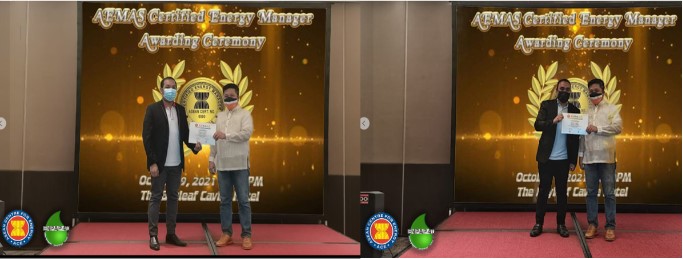
Engr. Rodel Hacla and Engr. Harry Alan Erasquin receiving their certification as ASEAN Certified Energy Manager from the ASEAN Center for Energy
Due to the overwhelming support of Pangasinan State University visionary President Dr. Dexter R. Buted, two of Pangasinan State University’s faculties successfully completed the international training and certification for ASEAN Certified Energy Manager offered by the ASEAN Center for Energy, furthermore, the Certified Energy Auditor and the Philippine Green Building Professionals Certification, said trainings resulted in the institutionalization of the Energy Efficiency and Conservation Office (EECO).
PSU ENERGY EFFICIENCY AND CONSERVATION PERSONNEL, CAMPUS EEC COORDINATORS ATTEND UNDERSTANDING ENERGY MANAGEMENT WEB SEMINAR
Led by its Director, Engr. Rodel Hacla, the Energy Efficiency and Conservation Personnel and Campus EEC Coordinators attended the Web Seminar on Understanding Energy Management last August 6, from 1:30 until 5:30 in the afternoon. Dr. Jeddper De Castro, President of...
2ND ENPAP 4.0 INC. MIDYEAR GENERAL MEMBERSHIP MEETING
The University Director of Energy Efficiency and Conservation Office, Engr. Rodel P. Hacla; Deputy Director and EEC Office Member, Engr. Harry Erasquin; and Engr. Pauline Roa, along with energy conservationists from across the country, have attended the 2nd ENPAP 4.0...
PSU Conducted Energy Audit
Meeting for Energy Audit planning, as a part of level 1 energy auditEnergy audit services provided by the Energy Efficiency and Conservation Office. The implementation of the Department of Energy's aforementioned law requires reportorial documents be collected...

